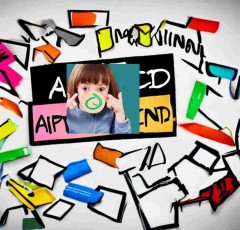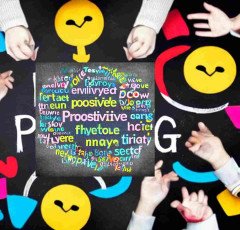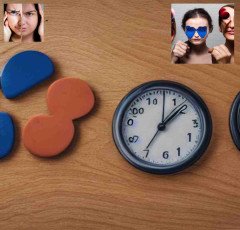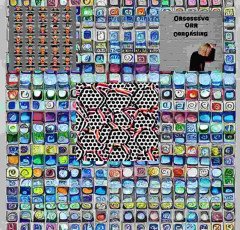
What is Attention-deficit hyperactivity disorder (ADHD) ?

In both children and adults, attention-deficit / hyperactivity disorder (ADHD) is a neurodevelopmental condition. Symptoms including hyperactivity, impulsivity, and inattention are what define it. People with ADHD may struggle to focus, follow instructions, maintain organization, and restrain their impulsive behavior.
ADHD is frequently identified in children, however it can also be identified in adults. Although the precise origins of ADHD are not yet entirely understood, scientists do think that environmental and genetic factors may contribute to its onset. A mix of medication, counseling, and lifestyle changes is frequently used to treat ADHD.
While living with ADHD can be difficult, those who receive the right help and treatment can still enjoy successful and rewarding lives.
various forms of ADHD can appear and have various effects on different people. While some may battle more with hyperactivity and impulsivity, some people may struggle more with inattention. People may occasionally experience both of these things at the same time.
Inability to concentrate, being quickly distracted, forgetfulness, and trouble following through on tasks or directions are all indications of inattention. Fidgeting, restlessness, interrupting others, chatting excessively, and having trouble waiting their time are all signs of hyperactivity and impulsivity.
The intellectual, social, and occupational functioning of an individual can be significantly impacted by ADHD. Due to attentional and impulsive issues, children with ADHD may suffer in school, and adults with ADHD may struggle with time management, organizing, and sustaining relationships.
The diagnosis of ADHD often entails a thorough evaluation that includes a physical examination, a study of the patient's medical and family history, and an evaluation of the patient's symptoms. Medication, such as stimulants or non-stimulants, behavioral therapy, and lifestyle modifications may all be part of the treatment plan.
It is crucial to understand that while medication may be beneficial for some people, ADHD cannot be cured by it. A good diet, consistent exercise, and enough sleep are all lifestyle modifications that can help control ADHD symptoms. Additionally, counseling can provide people the knowledge and skills they need to better control their symptoms and enhance their quality of life.
It's also crucial to remember that mental health conditions like depression or anxiety can coexist with ADHD. This may complicate both diagnosis and therapy, but
It is also important to remember that, despite being a problem, ADHD can occasionally have positive effects. Some people with ADHD are very creative and have the capacity to hyperfocus on tasks that they find interesting. Numerous people with ADHD have flourishing professions in a variety of fields, including entrepreneurship, the arts, and sports.
ADHD is a complicated and varied condition that can significantly affect a person's life. However, people with ADHD can learn to control their symptoms and live successful, full lives with the right diagnosis, care, and support. If you believe that you or a loved one may have ADHD, it's critical to get expert assistance.
For those with ADHD, there are a number of management and support measures that might be useful. These consist of: -
Structured schedules and routines: People with ADHD can stay focused and organized by developing a regular routine. Setting regular hours for meals, exercise, and sleep as well as blocking out time for work or study might all fall under this category.
Breaks and rewards
People with ADHD who frequently take breaks can stay focused and prevent burnout. Offering incentives or awards in exchange for completing duties can also be beneficial.
Tools for organization
People with ADHD might benefit from using tools like planners, calendars, and to-do lists to keep organized and recall crucial activities.
Meditation and mindfulness techniques can assist people with ADHD better control their stress and increase their ability to concentrate.
Support from loved ones, friends, and professionals
For those with ADHD, having a solid support system in place is important. This can include close relatives and friends who offer moral support as well as medical experts who can offer care and assistance.
Education and self-advocacy
Gaining a better understanding of ADHD and how it affects you personally might help you create efficient symptom management techniques. It can also be beneficial to speak up for yourself and let others, like employers or teachers, know what you need.
It should be noted that finding the best tactics and supports may require some trial and error because what works for one individual with ADHD may not work for another. However, people with ADHD can learn to control their symptoms and accomplish their goals if they are persistent and open to trying new things.
It's critical to dispel certain widespread misconceptions and fallacies concerning ADHD. These consist of: -
This claim that ADHD is a real disorder is untrue. The American Psychiatric Association and other professional associations accept ADHD as a true neurodevelopmental condition.
The idea that ADHD only affects youngsters is untrue. While it is frequently diagnosed in children, ADHD can also be identified in adults. In fact, many people with ADHD might not be diagnosed until they are adults.
Poor parenting or a lack of discipline contribute to ADHD
That is untrue. The development of ADHD may be influenced by external variables, but it is essentially a hereditary illness that alters how the brain develops and functions.
It's a frequent misperception that ADHD medication is addictive. Even though certain ADHD drugs include stimulants, when taken as directed, they are not addictive. In reality, medication may play a significant role in the management of ADHD in some patients.
It's a myth that people with ADHD can't concentrate. People with ADHD may find it difficult to pay attention for long periods of time to activities that do not pique their interest, but they are frequently hyperfocused on activities that they find stimulating or gratifying.
Must understand that ADHD is a complex and real condition that can significantly affect a person's life. We may endeavor to lessen stigma and improve knowledge of this condition by busting these myths and misconceptions.
The neurodevelopmental condition ADHD impairs impulsivity, hyperactivity, and attention. It can take many various forms and significantly affect a person's life. However, people with ADHD can learn to control their symptoms and live successful, full lives with the right diagnosis, care, and support.
Medication, behavioral therapy, and lifestyle modifications may all be used in treatment. Additionally useful techniques include organized routines, breaks and rewards, organizational tools, mindfulness and meditation, as well as support from loved ones, friends, and experts.
to dispel prevalent myths and misconceptions about ADHD and to acknowledge that it is a real disorder. By doing this, we can spread awareness of this disorder and lessen its stigma. It's critical to get tested for ADHD if you believe you or a loved one may have it.
It's also crucial to understand that getting an ADHD diagnosis and receiving treatment is not a sign of weakness. Seeking treatment is a proactive step towards managing symptoms and enhancing quality of life because ADHD is a complex condition that can have a substantial influence on a person's life. Involving loved ones, friends, and other support systems in the process of getting a diagnosis and receiving treatment can be beneficial.
It's crucial for people with ADHD to emphasize self-care and take measures to control their stress and anxiety. This can involve being physically active, engaging in mindfulness practices, and obtaining appropriate sleep. Creating a network of family and friends as a support system can also be beneficial.
Recognizing that many successful people with ADHD exist and that having this illness does not prevent one from accomplishing their goals is crucial. Individuals with ADHD can thrive and reach their full potential by learning effective symptom management techniques, getting support and treatment, and putting their attention on their talents and interests.
Without a doubt, it is crucial to concentrate on the talents and passions of people with ADHD, as these can play a significant role in their success. Some people with ADHD could be particularly talented in creative, analytical, or entrepreneurial pursuits.
Recognizing and capitalizing on these skills can be crucial for symptom management and success.
Additionally, it might be beneficial for those with ADHD to look for community and support through organizations and groups devoted to the condition.
These organizations can give members a feeling of community and connection as well as access to resources and knowledge about dealing with symptoms and overcoming obstacles. Overall, ADHD is a difficult and complex illness that needs continuing care and control.
However, people with ADHD can thrive and accomplish their goals with the appropriate diagnosis, treatment, and techniques. To manage symptoms and lead a full life with ADHD, it's critical to put self-care first, look for community and support, and concentrate on your strengths and interests.
It's crucial to remember that having ADHD does not entail that a person would inevitably face difficulties in every aspect of their life.
With the correct help and methods, many people with ADHD are able to achieve in their academic, professional, and social lives. Together, parents, teachers, and other caregivers must provide a controlled and supportive environment for kids with ADHD.
Providing clear expectations and procedures, breaking down activities into smaller pieces, employing positive reinforcement, and other strategies may be included in this.
Seeking adjustments, such as flexible scheduling or extra time for assignments, in the professional or academic context may be beneficial for adults with ADHD.
Maintaining a healthy lifestyle, engaging in regular exercise, and practicing mindfulness and meditation can also be beneficial.Overall, it's critical to handle ADHD with empathy and understanding, as well as to seek to lessen stigma and raise awareness of this difficult and complex condition.
With the right assistance and care, people with ADHD can flourish and accomplish their objectives. ContinueYes, lowering stigma and raising awareness are crucial to assisting those with ADHD.
It is crucial to understand that people with ADHD may experience prejudice, unfavorable stereotypes, and misperceptions as a result of their disease. As a society, it is our duty to promote greater knowledge of ADHD and to foster situations that are welcoming and supportive of those who suffer from the illness.
Promoting education and understanding of ADHD in classrooms, businesses, and communities is one method to lessen stigma.
Giving people information about the signs, causes, and treatments of ADHD can help to clear up confusion and encourage acceptance.
Additionally, it's critical to refrain from using stigmatizing language while discussing ADHD and to understand that a person's diagnosis does not define them.
Instead, we should put an emphasis on people's talents, passions, and successes and endeavor to build a culture that values and embraces neurodiversity.
It takes all of us working together to make society more welcoming and supportive. It is crucial for people with ADHD to express their feelings and stand up for themselves, as well as to have support and understanding from their communities.
It can also be beneficial to participate in advocacy activities on a larger scale, such as supporting laws and programs that support and include people with ADHD.
This may entail increasing access to mental health resources, lobbying for modifications and assistance in schools and workplaces, and dispelling misconceptions and stigma around ADHD.In general, lowering stigma and raising knowledge about ADHD is a difficult and constant effort.
In addition to a dedication to building a more inclusive and tolerant society, it calls for a combination of education, activism, and support.
Together, we can support those who have ADHD and encourage their full involvement and achievement in every facet of life.
















 Unlimited access to classes on illustration, photography, design, film, music
Unlimited access to classes on illustration, photography, design, film, music  Sennheiser
Sennheiser  Top Rated From Amazon
Top Rated From Amazon  Men Clothing
Men Clothing  Best Robotic Vacuum Cleaners
Best Robotic Vacuum Cleaners  Creative Brief For Video Shoot
Creative Brief For Video Shoot  NordPass
NordPass  The Click Engine
The Click Engine  ELECTRONIC ACCESSORIES
ELECTRONIC ACCESSORIES  Best Home Appliances
Best Home Appliances  Hello Theme
Hello Theme  ASPINAL LONDON
ASPINAL LONDON  Online Marketing
Online Marketing  TitTok Revolution
TitTok Revolution  Graphics & Design
Graphics & Design  Best Selling Books
Best Selling Books  NordLocker
NordLocker  Favorite Company (Cuelinks)
Favorite Company (Cuelinks)  The Secret Email System
The Secret Email System  NordVPN
NordVPN  Online Technology Classes
Online Technology Classes  BEST SELLER TOP10
BEST SELLER TOP10  SOFAS
SOFAS  One World Collection
One World Collection  Unreal Engine 5 For Beginners Learn The Basics Of Virtual Production
Unreal Engine 5 For Beginners Learn The Basics Of Virtual Production  RPM 3.0
RPM 3.0  Artificial Intelligence
Artificial Intelligence  Hot Bags For Pain Relief
Hot Bags For Pain Relief  SEO Checklist
SEO Checklist  ASUS Laptop
ASUS Laptop  All Wireless Products
All Wireless Products  Amazon Best Selling Products
Amazon Best Selling Products  Best Sellers On Amazon
Best Sellers On Amazon  Only For The United States
Only For The United States  Smart Doorbell
Smart Doorbell  Women Fashion
Women Fashion  1150+Trendy kids coloring pages Bundle
1150+Trendy kids coloring pages Bundle  Acer Laptop
Acer Laptop 
















